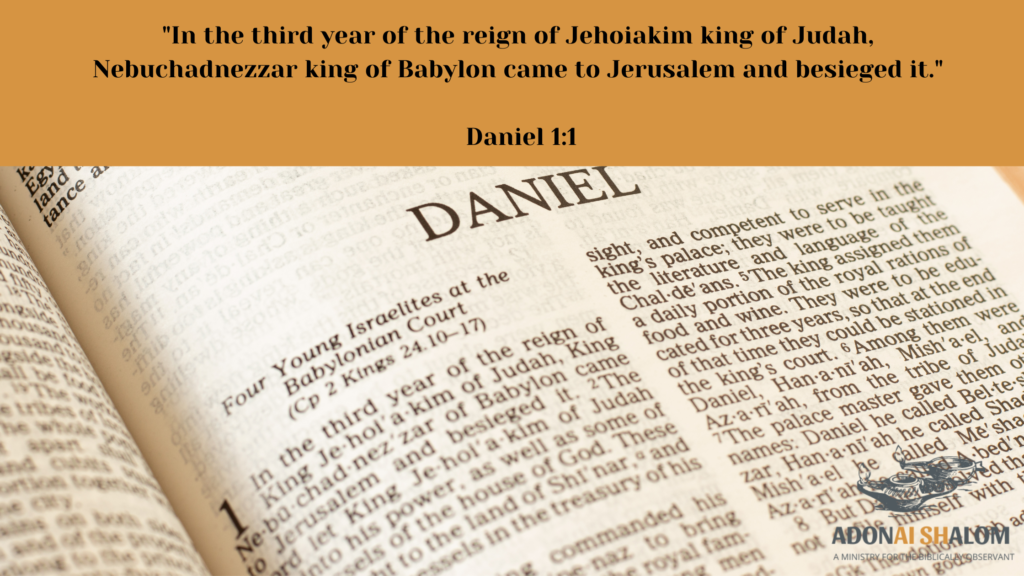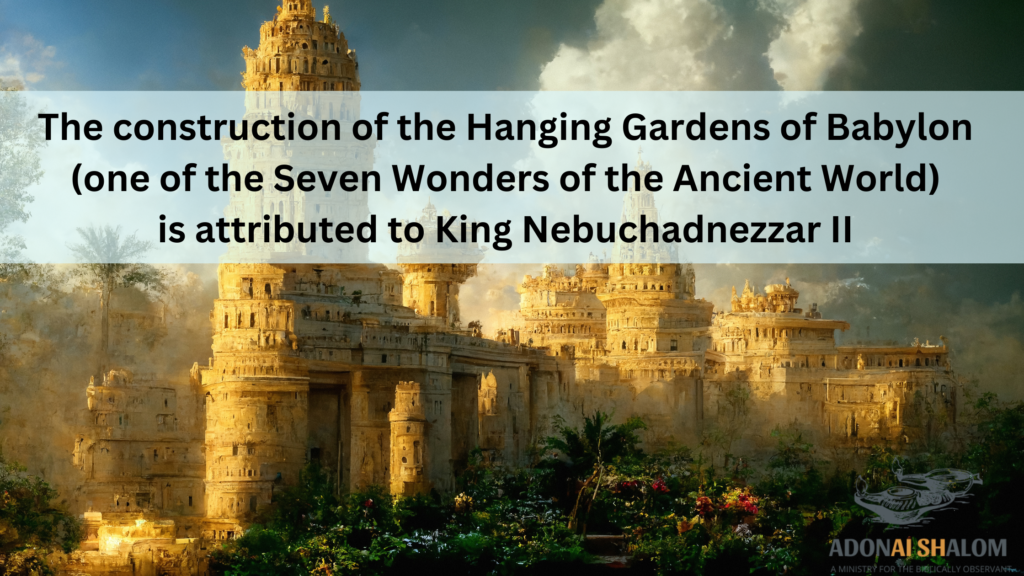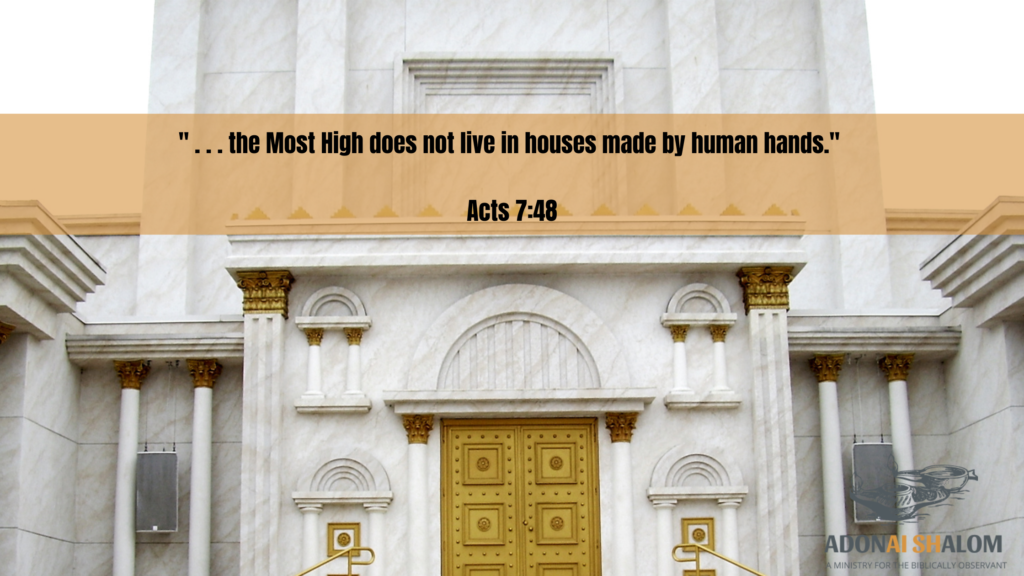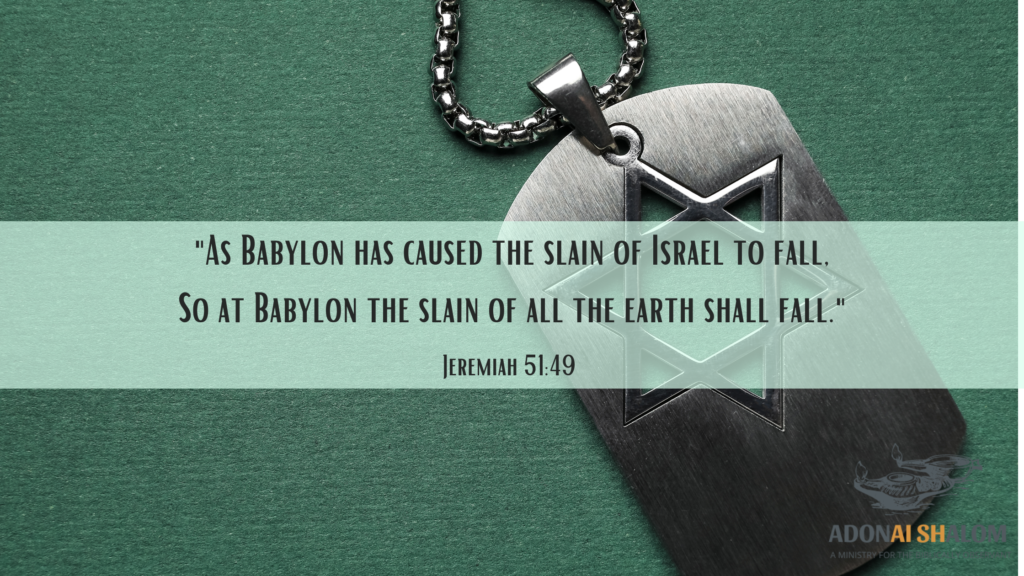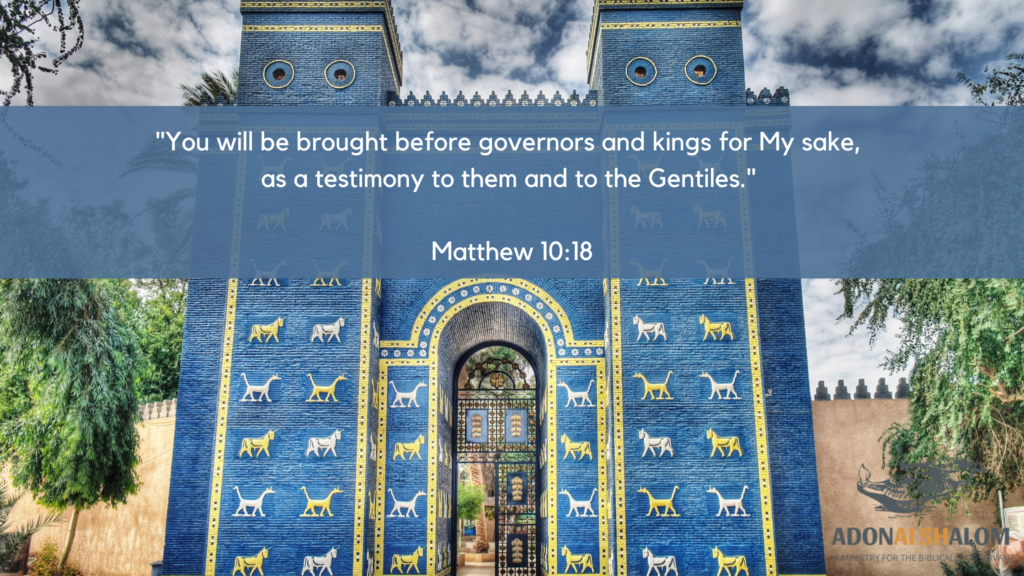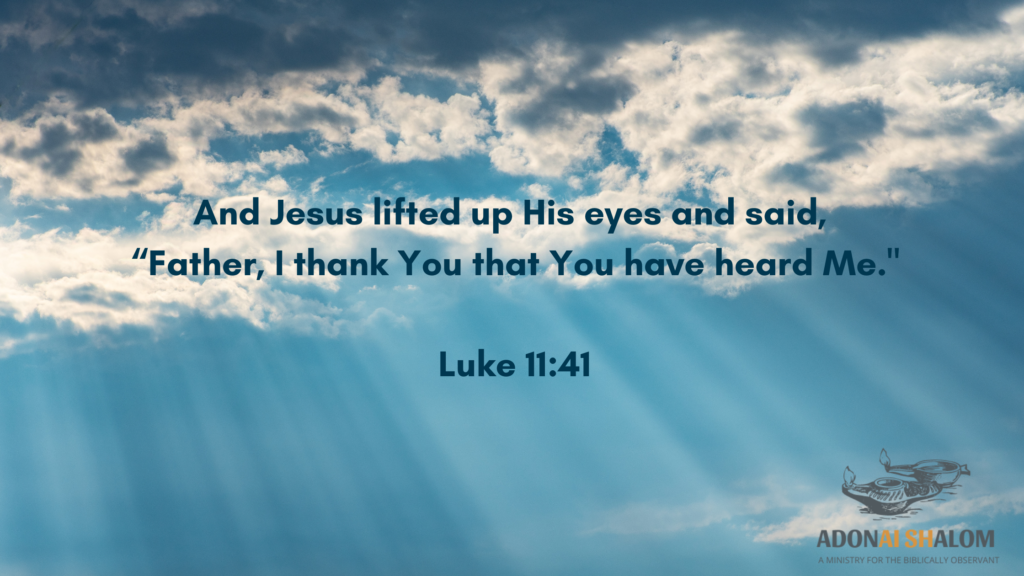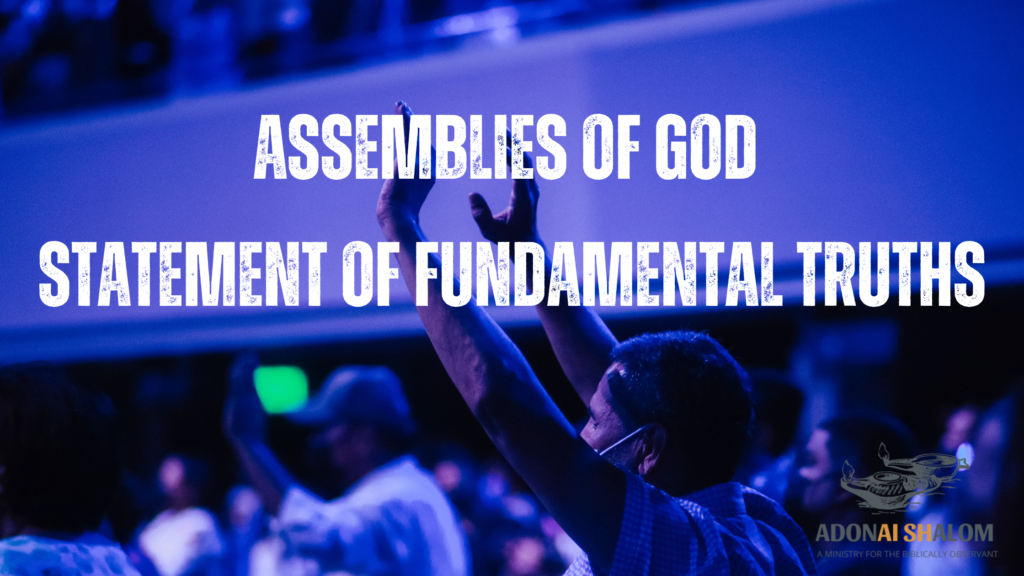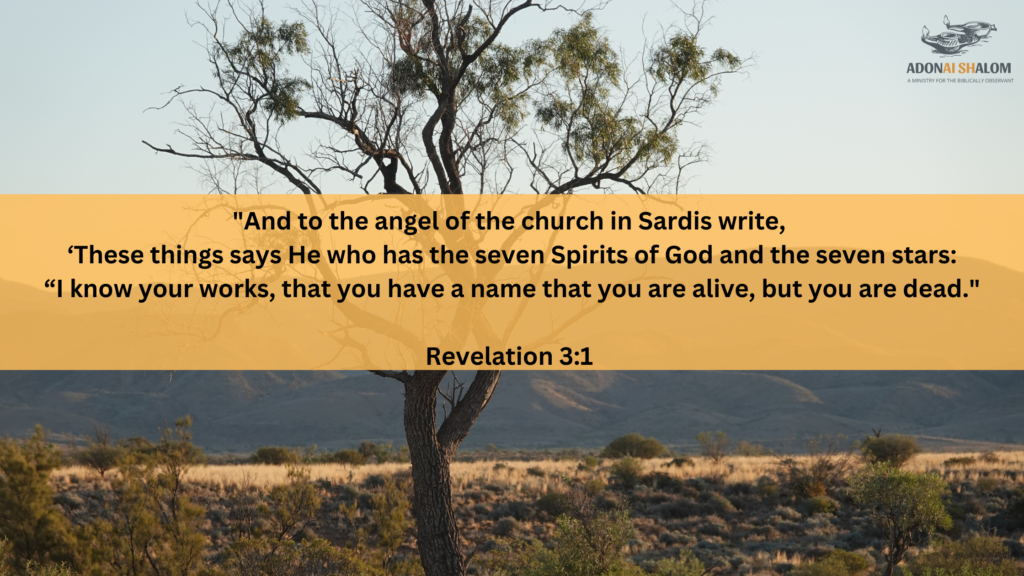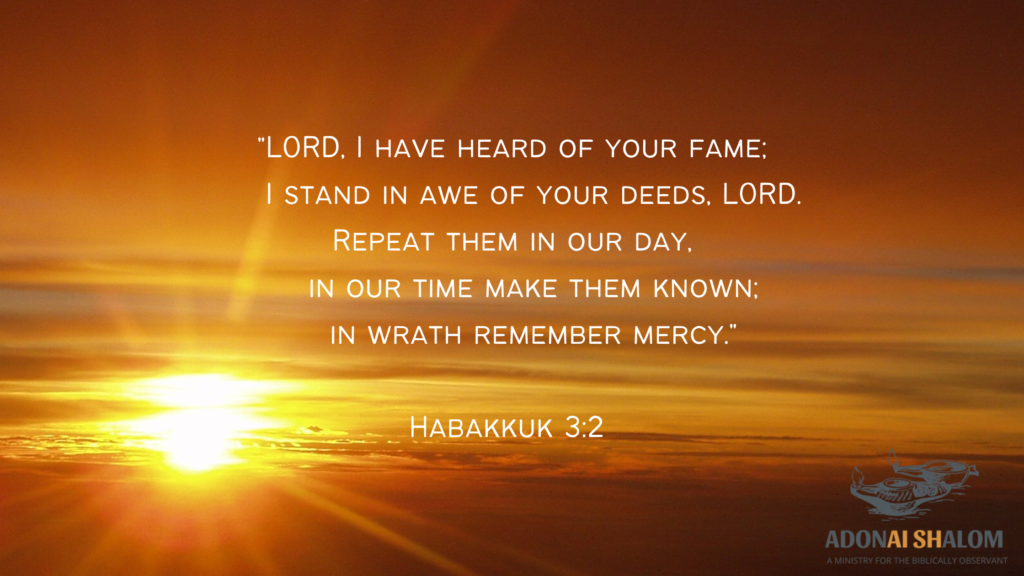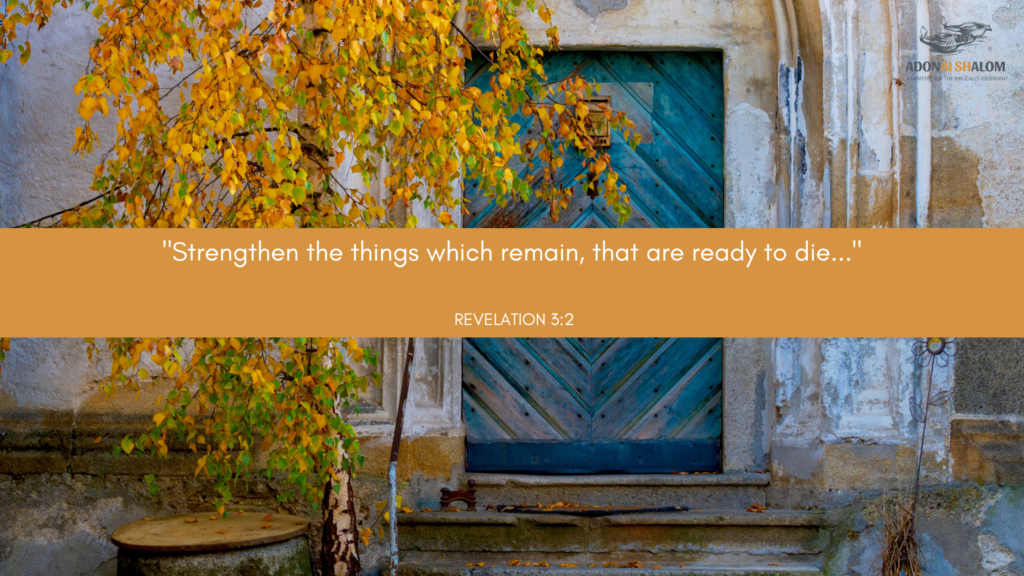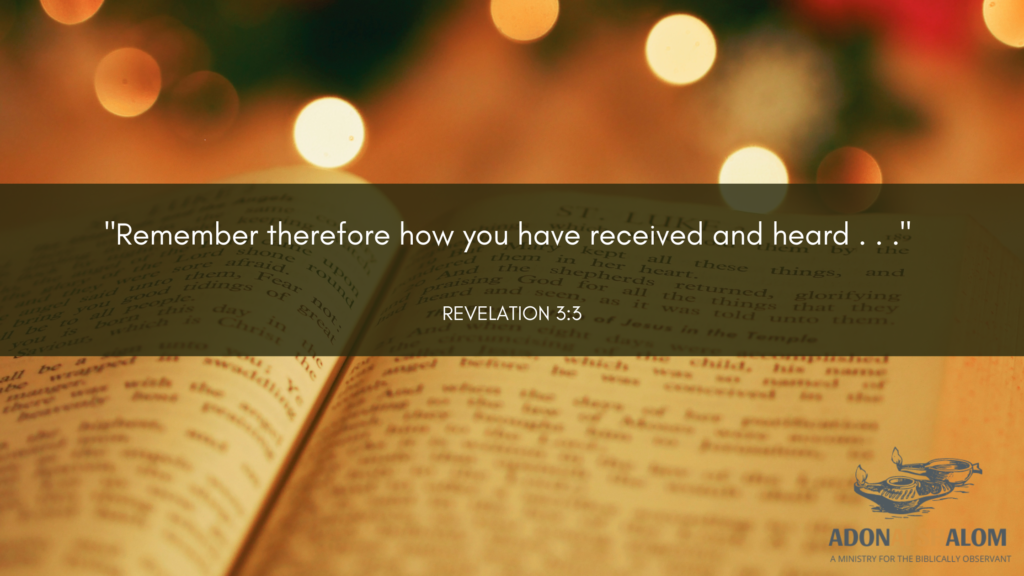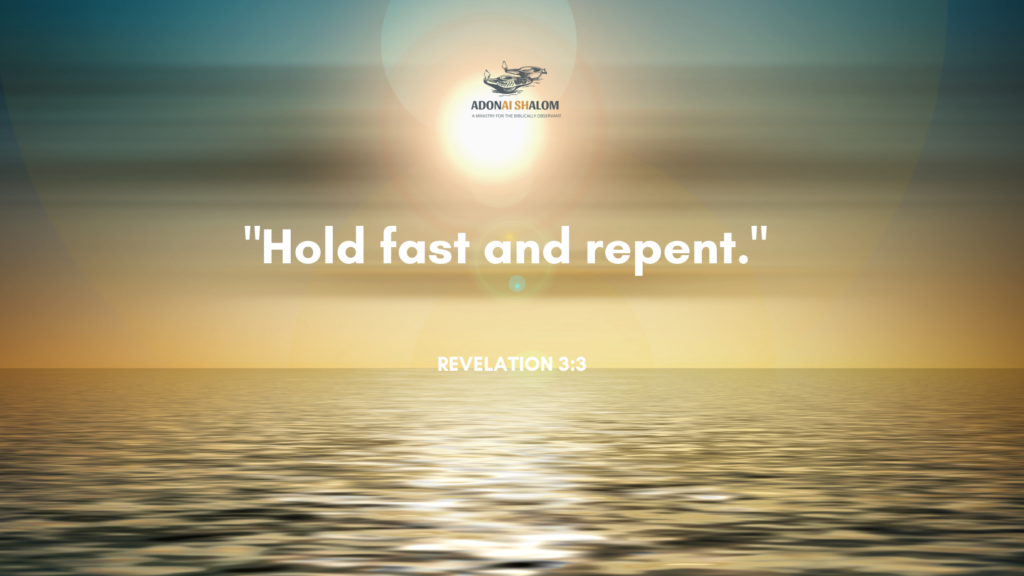Daniel 2: Dreams and a vision in the night
King Nebuchadnezzar was troubled by dreams. Explore Daniel 2 and how the LORD granted great favor to Daniel and his friends.
Recap of Daniel 1: Steadfastness in love and faith
Daniel 1 highlighted the stark contrast between the godly faith of the young captives and the Babylonian culture. King Nebuchadnezzar and his staff tried their hardest to impose their pagan, polytheistic culture upon the Hebrew youth.
While Daniel, Hannah, Mishael, and Azariah did learn the Chaldean language and did learn about the Babylonian ways, they did not internalize it. They remained steadfast in their love for and commitment to God Most High, the only True God, the God of Israel.
King Nebuchadnezzar was troubled
Daniel tells us in Daniel chapter 2 that Nebuchadnezzar was troubled by vivid dreams.
Daniel 2:1
Nebuchadnezzar’s Troubling Dreams
Daniel 2:1 identifies Nebuchadnezzar’s dreams as having happened in the second year of his reign. This would be 603BC. In the Near East, there were different customs for the counting of years. Daniel preferred a whole year system, whereas Jeremiah counted part of a year as a full year. This has led to some people concluding that the Bible has discrepancies, but it does not.
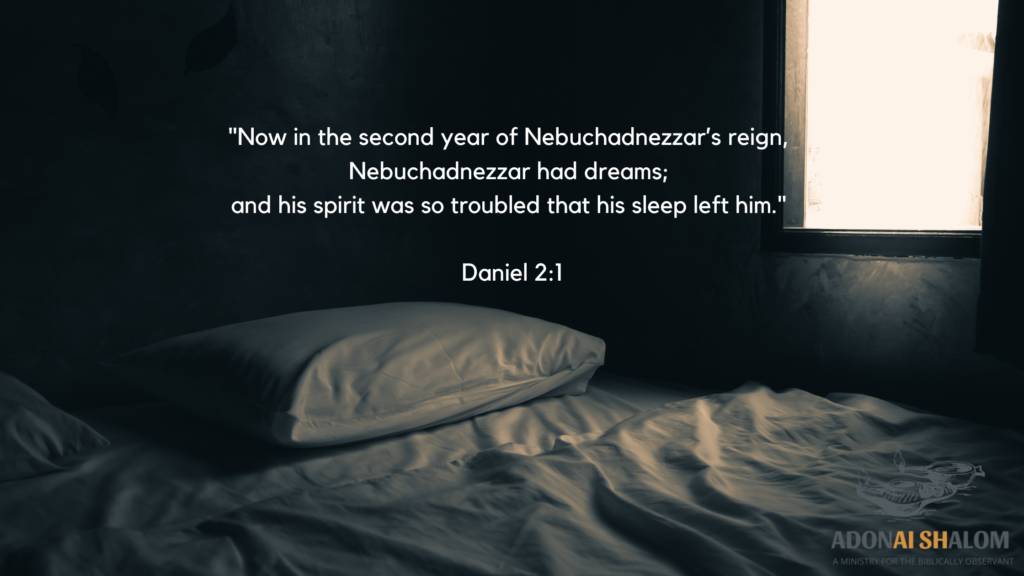
King Nebuchadnezzar was troubled because he had the weight of the world on his shoulders. Babylon was an enormous, prosperous empire and Nebuchadnezzar planned to keep it that way.
If we jump ahead to Daniel 2:29, we see that Daniel recognizes that the king was thinking at night when he was laying down in bed – worried about the future:
King Nebuchadnezzar struggled with psychological issues, and here we see signs of anxiety and insomnia that will increase throughout the book of Daniel.
Daniel 2:2
The “Wisdom” of Babylon: Magic, Astrology, & Sorcery
King Nebuchadnezzar brought together his arsenal: those he considered “wise” enough, and really “spiritual” enough to decipher the vivid dreams he was experiencing:
- Magicians – magicians are illusionists. They trick you and play the games of the dark arts. In 1877, François Lenormant, a French assyriologist, published a book titled “Chaldean Magic: Its Origin and Development.” He studied a translation of a large tablet found in Nineveh’s royal palace (modern day Iraq) which contained “28 formulas of deprectory incantations against evil spirits, the effects of sorcery, disease, and the principal misfortunes that attack people in the course of daily life.” According to the Thomas Nelson NKJV Study Bible, the word translated as “magicians” literally refers to those who “use the pen” – people who were very learned in the “sacred” writings of the Babylonians. They would write out their incantations.
- Astrologers – astrologers studied the stars. Did you know that the Babylonians invented the modern horoscope? Capricorn and Sagittarius . . . the Babylonians invented the 12 signs of the zodiac and relied on their interpretation of the planetary alignments and constellations to predict outcomes. Astrologers served as priests in the Babylonian religion so they used the zodiac signs to attempt to determine the will of the gods.
- Sorcerers – these are the witches and warlocks of Babylon. They would use satanic spells and incantations, amulets, and rituals of the dead to invoke demonic influences. They genuinely “received power from evil spirits” (NKJV Study Bible).
- and Chaldeans – here Chaldeans is probably referring to a select group of Chaldean advisors (who likewise would have been well-educated in the Babylonian customs
The king of Babylon, Nebuchadnezzar, insisted that the magicians, astrologers, and sorcerers present themselves before him to tell what the king had dreamed.
Those who were accustomed to creating fear through their sorcery would now be very fearful of whether or not they would be able to correctly guess and describe Nebuchadnezzar’s mystery dreams.
Nebuchadnezzar was known as a brutal king and any misstep could merit execution.
Daniel 2:3
Nebuchadnezzar’s Anxiety
“And the king said to them, “I have had a dream, and my spirit is anxious to know the dream.” Daniel 2:3
Nebuchadnezzar did not have a relationship with God that could provide peace to his troubled soul. His dreams caused him to be unsettled and anxious.
However, notice that the Bible is talking about dreams, not “terrors of the night” or “nightmares.” The dream impacted Nebuchadnezzar enough that he wanted an interpretation, but this was a God-given dream.
Nightmares come from the evil one. While what God might reveal to us may be unsettling at times, he is not the author of confusion nor of fear.
Daniel 2:4-6
Fake confidence and the king’s brutality
“O king, live forever” was their way of saying, “Long live the king!” The Chaldean advisors praised their earthly king in an effort to keep him appeased and at least fake some confidence.
King Nebuchadnezzar wanted relief from his distress so badly that he made a firm decision regarding the consequence should those summoned before him fail to correctly identify the dream and its interpretation: he would have them cut into pieces and their homes burned.
There was an ancient practice of dismembering bodies and so this is what the king is referring to when he says anyone who doesn’t know the dream will be chopped up. (See 1 Samuel 15:33, Daniel 3:29)
On the flip side, if the advisors could provide what the king wanted, King Nebuchadnezzar promised to reward them well.
Daniel 2:7-13
The Chaldean advisors admit their limitations
For this reason the king was angry and very furious, and gave the command to destroy all the wise men of Babylon. So the decree went out, and they began killing the wise men; and they sought Daniel and his companions, to kill them.” Daniel 2:7-13
King Nebuchadnezzar’s advisors realized the peril of their situation. They asked the king to at least reveal the dream so they could provide their interpretation.
However, King Nebuchadnezzar would make it very obvious that the sorcerers and magicians were not as powerful as perhaps they wanted him to believe. He replied to them that if they had the ability to identify his dream he would trust that they had the power to give the interpretation.
The Chaldean advisors would have been panicking at this point. They admit that no one could possibly know the dream “except the gods.”
Living up to his harsh reputation, King Nebuchadnezzar ordered all the wise men of Babylon killed. Daniel and his friends have not been mentioned in this chapter until now, but they were considered among the Chaldean wise men and were therefore about to be killed.
In another sign of King Nebuchadnezzar’s questionable mental state, his desperation causes him to fixate on wanting to kill the very people who could potentially give him his answer. He demonstrates very self-destructive behavior.
Daniel 2:14-18
Daniel & Arioch
Young Daniel spoke with the captain of the king’s guard, a man named Arioch. ארי The name Arioch in both Hebrew and Aramaic indicates a meaning like “Lion-like,” an appropriate name for a military leader.
Daniel approached Arioch with “counsel” and “wisdom.” He didn’t know why the decree was so “urgent”/”harsh,” but Arioch filled him in on what was going on.
Daniel had enough favor to proceed to go directly to the king to ask him for some time to fulfill the king’s request. Daniel, Hananiah, Mishael, and Azariah sought “mercies from the God of heaven concerning this secret” and prayed that they would not be killed along with the others.
Whenever you face a challenge or need God’s direction, seek His mercies! Pray! Your very first line of attack should be as a prayer warrior!
Daniel 2:19
An Answer to Prayer
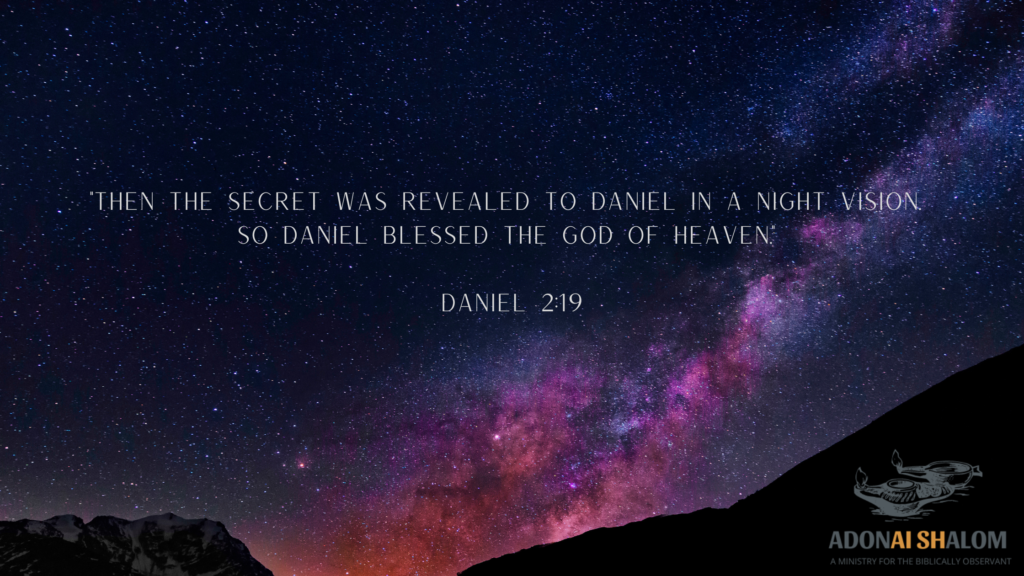
Daniel’s leadership in prayer and consistent faithfulness to pursuing God’s will and way resulted in God granting him supernatural favor. Daniel received a vision in the night that revealed the secret dream.
Dream and Visions
Do you notice in verse 19 that the Bible says Daniel received a night vision?
Normally, visions are understood as occurring during the day, while dreams occur at night.
I believe God wants us to notice that Daniel had been awake. He was seeking God with all his might and the Lord gave him a vision.
Daniel 2:20-23
Daniel praises the God of his fathers
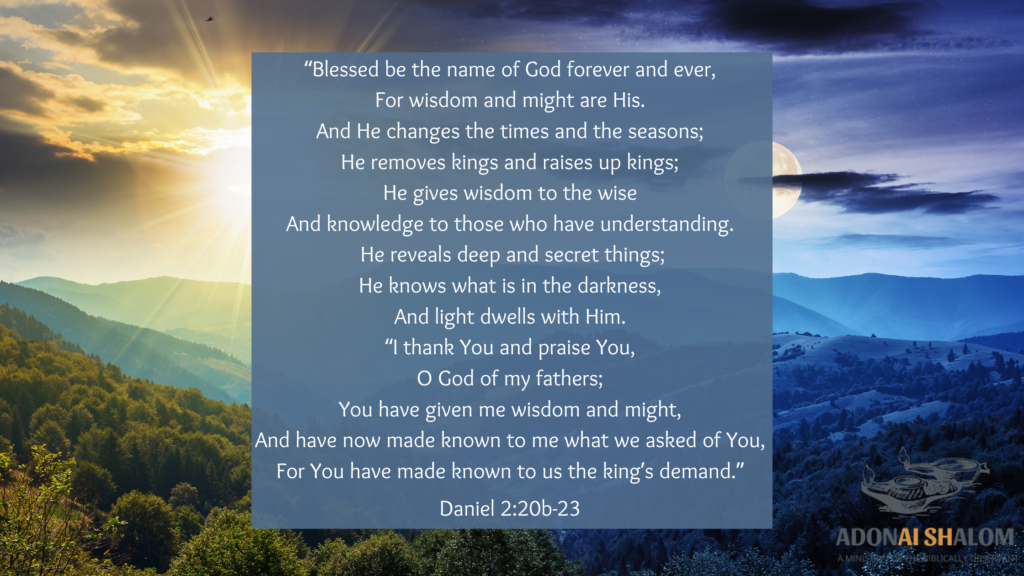
Praise and Prayer = Results
Daniel very naturally praised the God of His fathers.
When Daniel says, “Blessed be the Name of God forever and ever.” The construction in Aramaic could also be translated, “Let God’s Name be blessed/praised forever and ever.” It is clear that Daniel is exalting God and inviting others to do the same.
He gives reasons: because wisdom and might belong to God.
And God is the one who changes the times and seasons (times and seasons will become very important as we continue along in Daniel). God has power over the weather and the days and the times; God is ultimately King over all the kings of the earth and He removes them and raises new ones up.
God alone is Wise and All-Knowing. He gives wisdom and knowledge to those who are wise and have understanding. Notice – he “gives wisdom to the wise” and “knowledge to those who have understanding” – already. Daniel is talking about increase. Those who already have some wisdom and knowledge will receive still more, but he is not saying that God is giving wisdom to the unwise or knowledge to those lacking understanding. God has chosen to give increase to those who understand.
In Babylon, this would have been a controversial position. Daniel is making the claim that the wise in the kingdom are not wise due to their own wisdom and knowledge nor did their insights come from the Babylonian deities. God alone holds true wisdom and knowledge.
Likewise, God alone can reveal deep and secret things.
Though we cannot see in the darkness, God knows what is there and He illuminates all because Light dwells within Him. He is the Light of the world!
Daniel is thankful and acknowledges that God has given him wisdom and might (or strength). He is thankful that God answers prayer and has made known to him and his friends the king’s demand.
Daniel 2:24-27
Daniel before the king
But there is a God in heaven who reveals secrets, and He has made known to King Nebuchadnezzar what will be in the latter days. Your dream, and the visions of your head upon your bed, were these: (Daniel 2:24-27)
Arioch the military commander must have had a pretty good relationship with Daniel. Remember, Arioch is the same man who filled in Daniel about what was happening with the killings of the Chaldean wise men.
This time Daniel filled in Arioch on some important news: Daniel told him that he knew the interpretation and asked Arioch to bring him before King Nebuchadnezzar.
Arioch responded quickly. He knew the urgency and gravity of the matter because lives were at stake. Without the interpretation, Arioch himself would have to continue to carry out the king’s orders to kill all of the wise men of Babylon. Daniel 2:25 says Arioch quickly brought Daniel before King Nebuchadnezzar.
I find it interesting that Arioch specifies here that the man who has the interpretation is one of the “captives of Judah.” It seems Arioch supports Daniel because he does not suggest that Daniel “might” know the interpretation, but rather says with certainty: “who will make known to the king the interpretation.”
King Nebuchadnezzar asks Daniel (Belteshazzar) directly if he is able to describe the dream and to give the interpretation.
Daniel boldly affirms that he has this ability because of His relationship with the God of heaven. Daniel begins by reminding the king that his wise men and astrologers and magicians and soothsayers have been unable to reveal the king’s secret dream.
And then Daniel makes a faith statement. He does not believe in the polytheism of King Nebuchadnezzar’s Babylon. He declares “there is a God in heaven.”
One God.
Above all else.
“But there is a God in heaven who reveals secrets. . .” Daniel 2:28a, emphasis added
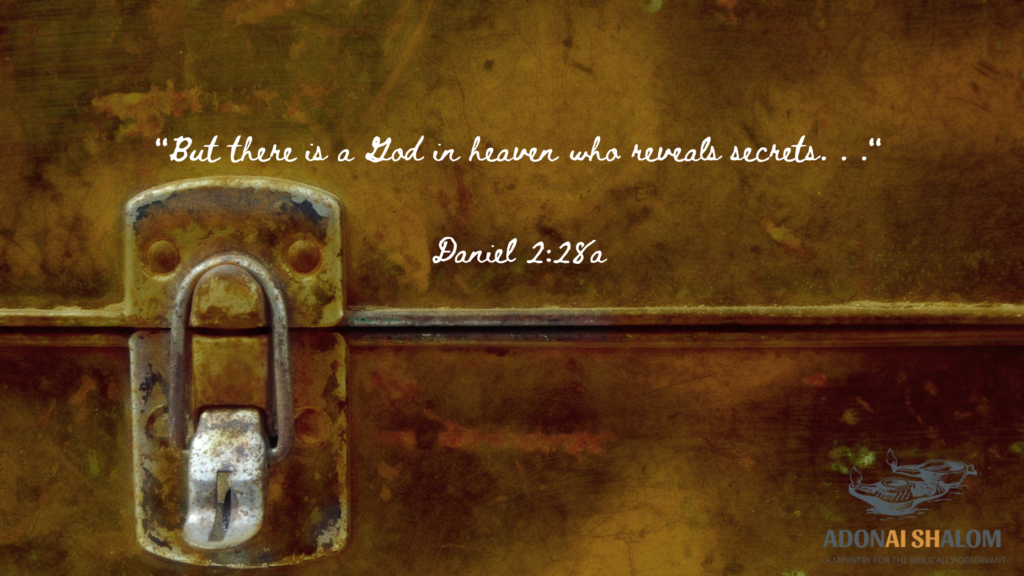
Daniel proceeds to inform the King of Babylon that the God of Heaven has revealed the mystery dream. Daniel is making quite the claim: that his God – the God of the Judean captives – is indeed the Omniscient, All-Powerful God and that Daniel will serve as His spokesman for a prophetic word that will reveal what will happen in the future.
Daniel begins:
Daniel 2:29-30
The mystery revealed to save lives
The Chaldean culture was very focused on their view of “wisdom.”
So Daniel makes very clear that although he is counted among the wise, it was not because of his human wisdom that he was able to ascertain the secret dream.
God alone, All-Merciful and All-Knowing chose to reveal the dream to Daniel to spare the lives of the wise men (particularly those of Judean descent). God loves the Chaldean and the Judean: He wants all to learn of Him and trust in His ways. God also loves King Nebuchadnezzar! In His mercy, God wants King Nebuchadnezzar to understand the dream he was given and have time to repent.
Daniel 2:31-35
Nebuchadnezzar’s dream in detail
Daniel 2:36-45
The interpretation of King Nebuchadnezzar’s dream
Daniel with his friends had prayed for revelation and the interpretation together. Daniel included them in the presentation of the interpretation. The dream was a revelation about four kingdoms represented by an image comprised of four metals.
Ultimately, this is an end times revelation about world empires and the return of Christ.
36 “This is the dream. Now we will tell the interpretation of it before the king.
39 But after you shall arise another kingdom inferior to yours;
then another, a third kingdom of bronze, which shall rule over all the earth.
I found an illustration that you may find helpful. I believe “bronze” is a bit more accurate than “brass,” but besides this small detail, the rest of this illustration seems accurate:
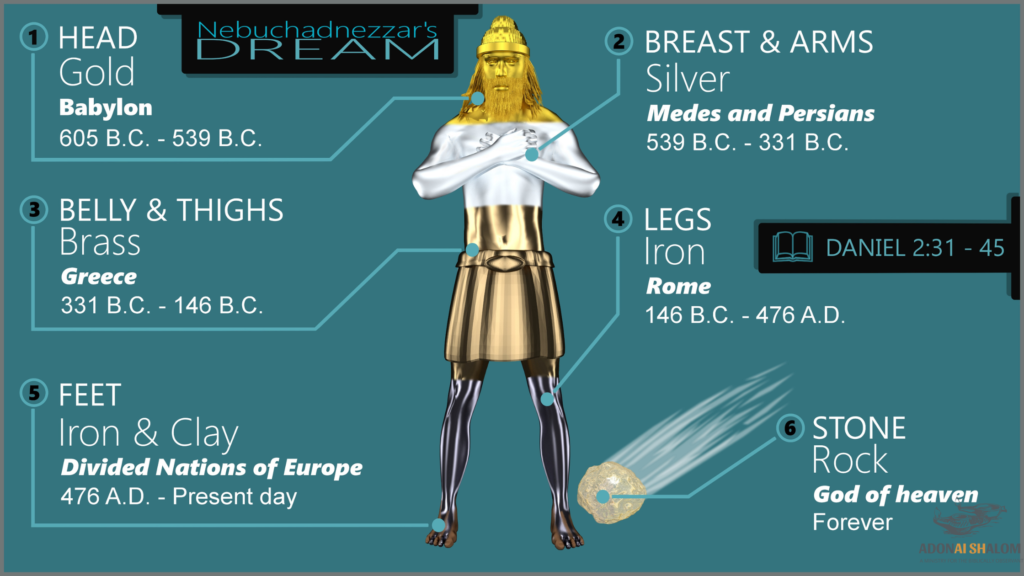
Notice that while gold would be prized as most valuable, the four materials associated with the different empires go down in value but up in strength.
The First Kingdom
It is revealed to King Nebuchadnezzar that he is the head of a series of kingdoms. King Nebuchadnezzar has achieved great wealth and fame, a “king of kings.” It is generally accepted that the first kingdom depicted by the dream is Babylon.
The Second Kingdom
Medo-Persian Empire
The next kingdom would be inferior, but still strong. This refers to the Medo-Persian empire. Persia today is known as Iran. The Medes were from Media, a city important to the Islamic people of Iran. Today, the descendants of the Medes are likely the Kurds of Iraq. The people of Media joined together with the Persians (like the image describes the two arms and chest).
King Cyrus and the gates of bronze and bars of iron
King Cyrus was the ruler of the Medo-Persian Empire.
We can find out more about him in Isaiah 45:1-4
This passage reveals to us that Cyrus, a Gentile king, did not know the God of Israel yet God was using him to bless Israel. Notice the references to breaking the gates of bronze and the bars of iron – components of the future kingdoms.
The Medo-Persian Empire was conquered by Alexander the Great, a Macedonian (Greek) in 331BC.
The Third Kingdom
Grecian Empire
The third kingdom is represented by bronze. This refers to the Greek (or “Grecian”) Empire. The military of Greece may have used bronze for their armor and weaponry.
Alexander the Great
In 336BC, Alexander the Great conquered Greece and very rapidly extended the empire to the edges of the known world at that time, including the conquering of the Medo-Persian empire. The Grecian Empire extended as far south as Egypt, east to Syria and Persia, and all the way to the border of Pakistan with India. Alexander’s military might was so ferociously successful that it is said that at one point Alexander wept because he couldn’t think of any more places to conquer in his quest for world domination.
Although Greece was a strong empire, its division into warring city-states weakened it over time and Greece eventually fell to Rome in 146BC following the Macedonian wars.
The Fourth Kingdom
Roman Empire
The fourth kingdom is represented by iron. This represents Rome, the last significant world empire. The Bible describes the image in King Nebuchadnezzar’s dream as having two iron legs (Daniel 2:33).
The two legs could represent division, in that Rome became divided between the Eastern and Western empire (Constantinople/Byzantium vs. Rome/Mediterranean).
Rome’s influence has lasted even to our time.
Roman architecture still very much influences our own government buildings.
The concepts of having a senate, courts, and military codes of ethics, tactics, and strategies all came from Rome.
Have you ever considered the names we use for rulers and kings?
Caesar has morphed into “kaiser” in German and “czar” in Russian.
I find it to be fascinating!
Feet of iron and clay
Rome stood tall, but began to crumble just as the feet in the image show an unstable mixture of iron and clay. No other world leader has ever been as strong as the earlier kingdoms. There are several different opinions as to what exactly the feet represent. Many would agree it refers to the divided countries of Europe.
A very recent article posted by one of my favorite ministries, One for Israel, was so timely! The article is titled, “Daniel and the dream: Feet of iron and clay.” I was finishing up my study of Daniel 1 when their study of Daniel 2 popped up on my social media feed. God is good!
I was intrigued by a question raised in the article: “Could it be that the feet of iron and clay might be the Islamic colonialism that has taken so much ground, and its uneasy alliance with the cloying humanism that has overrun the west?” (One for Israel, Feb.12, 2024).
The article is definitely worth your time in reading as your study this passage in Daniel 2. Check it out!
Toes
The feet of the statue image are divided into toes. The NKJV Study Bible considers the perspective that “the Roman Empire will one day be revived (v.41), will be ruled over by 10 rulers (the toes of v.42), will feud over internal problems (v.43), will witness the return of Jesus Christ (v.44) and will be destroyed by Christ at the Second Coming (v.45).”
The Stone and God’s Eternal Kingdom
While the kings of this earth vie for power and supremacy, God reveals that He will set up His Kingdom in the midst of all that chaos. The stone cut out “without hands” refers to the supernatural work of Christ and His eternal kingdom. “The stone that struck the image became a great mountain and filled the whole earth.” Daniel 2:35c For more about uncut stones and their spiritual significance, see Joshua 8:30-31.
As the seraphim cry out in Isaiah 6:3c: “The whole earth is full of His glory!”
Daniel concludes his interpretation with God-given confidence: the dream is certain and its interpretation is sure.
Just as Daniel predicted, these empires did indeed rise and fall in the precise order given in the dream and interpretation.
Jesus came to dismantle the world’s empires and to set up the indestructible eternal Kingdom of God! (Daniel 2:44)
The Second Coming of Christ
The dream reveals that there would never be another world empire as great as Rome. Rome was the last great kingdom. There would be four empires that would rule the world (and fall) before the return of our Messiah.
This means, His return is imminent!
Daniel 2:46-49
Daniel and his friends receive a promotion
King Nebuchadnezzar recognizes the immensity of Daniel’s interpretation. He fell on his face in wonder and confessed that the God of Daniel, Mishael, Hananiah, and Azariah is the “Lord of kings.” This does not mean; however, that King Nebuchadnezzar converted – he was acknowledging the supremacy of the God of the Judeans “at least in matters of divine knowledge” (NKJV Study Bible) but he did not renounce his own deities.
Then King Nebuchadnezzar promoted Daniel to serve as the ruler (the governor!) of the whole province of Babylon and the chief administrator over all the wise men! No doubt the wise men gladly served under Daniel’s leadership because he had saved them from mass execution!
Daniel requested that King Nebuchadnezzar allow his friends to also serve in the government, which was approved. Daniel sat in the gate of the king which is another way of saying he served on the king’s royal court.
Isn’t it amazing how God had a marvelous plan to rescue and bless Daniel and his friends? No matter what you face in life, always remember: God is willing to help you and raise you up to accomplish things you never imagined. Daniel and his friends persisted in prayer and faith despite the fear and anxiety that the enemy would have been trying to impose upon them. Whenever you feel discouraged or under pressure, seek God with all your heart and He will minister to you! Be open to the power of the Holy Spirit working in your life through dreams and visions, especially in these last days!







